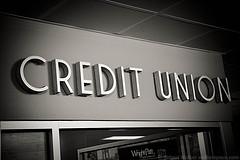Credit Unions Seeing Surge In New Accounts
As you may have heard, more than a few people around the country have been out and about in recent weeks in protest of — well, in protest of a lot of things. But what many of these people (and many of us who are sitting in our homes) share in common is that they’re fed up with the super-sized banks and are looking for alternatives. This appears to have led a growing number of people to the front door of their local credit unions.
The Navy Federal Credit Union, the world’s largest credit union with $46 billion in assets and 3.8 million members, tells ABC News it’s seen a threefold spike in new checking accounts since this time last year.
The chief executive officer of the Chicago Patrolmen’s Federal Credit Union, is seeing similar growth: “In October, we’re on pace to go about 40 percent above that in new checking account and debit card activity.”
“In our experience, this is new,” Karen Tyson, the National Association of Federal Credit Unions’ senior vice president for marketing and communications, told ABC News. “This is a different phenomenon. There seems to be quite a bit of distrust, quite a bit of apprehension, quite a bit of frustration among the average Americans out there with the larger institutions and the Wall Street institutions.”
Among the tips the Credit Union National Association offers for locating and transferring your funds to a credit union:
*Compare credit union rates and fees to those of banks. The Credit Union National Association estimates that consumers annually save more than $6 billion in better rates and lower fees by using a credit unions rather than banks.
* Ask about free checking and debit. About 80 percent of credit unions still offer free checking, and more than 70 percent have debit card programs, typically with no fees, according to the Credit Union National Association.
* Check if the credit union has all the products you’re looking for. These days many credit unions offer most of the same services and products you’d find at a bank — mortgages, credit cards, IRAs, home equity lines, even small business loans.
* Ask about deposit insurance. Nearly all of the 7,500 credit unions in the U.S. are federally insured, meaning their deposits are insured up to $250,000 by a federal deposit insurance fund administered by the National Credit Union Administration, just as the FDIC does for banks.
* Ask for a “switch kit”: Many credit unions have switch kits, a compilation of all of the forms, rules and suggestions you may need to make your switch as seamless as possible. Just ask the credit union you want to join for its switch kit.
Want more consumer news? Visit our parent organization, Consumer Reports, for the latest on scams, recalls, and other consumer issues.


